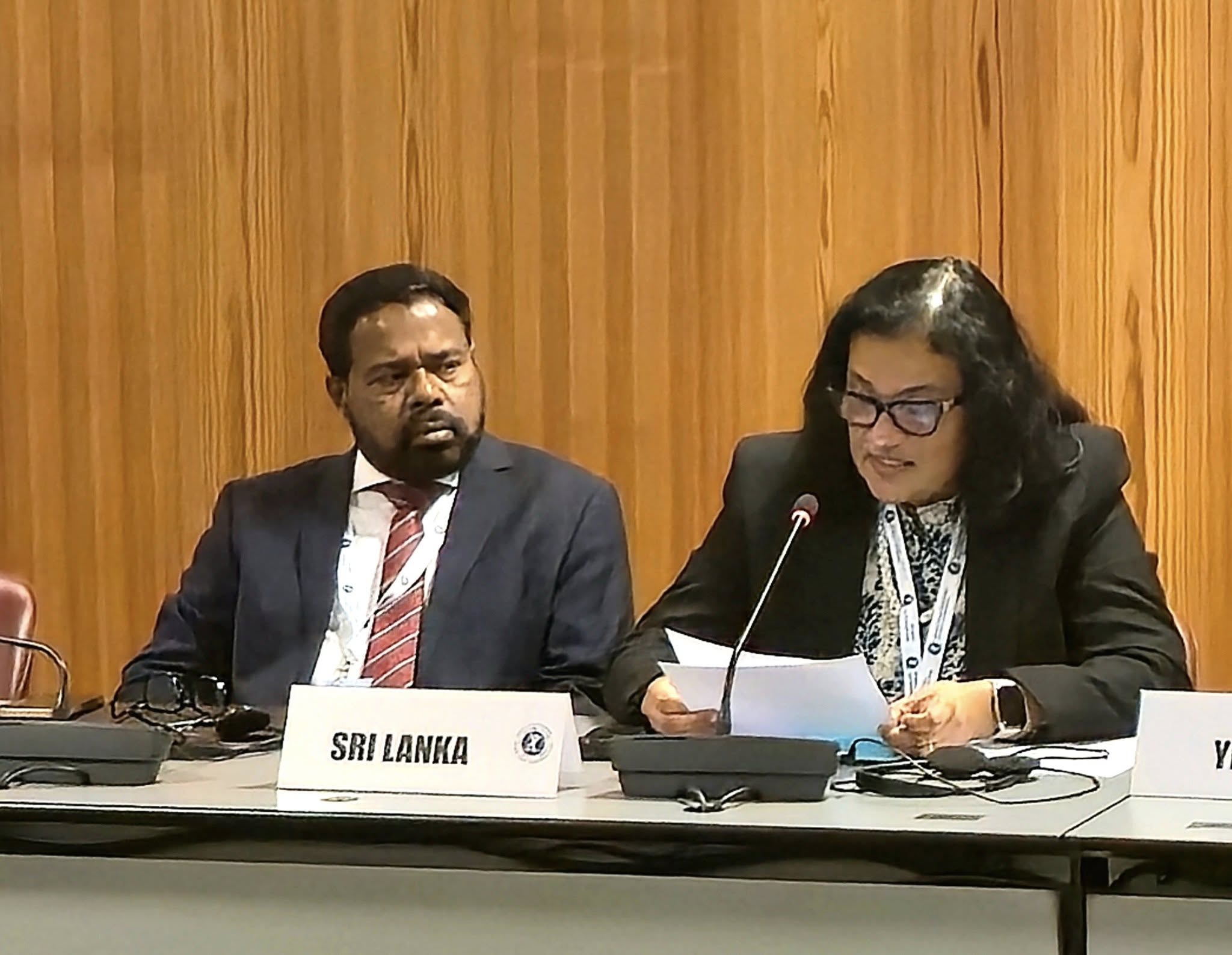
Distinguished Colleagues, Members of the Committee on Victim Assistance, Representatives of States Parties, and Partners,
On behalf of the Government of Sri Lanka and the National Mine Action Centre (NMAC), I am honored to share our progress in strengthening national frameworks for victim assistance, in alignment with Actions 30 through 36 of the Siem Reap–Angkor Action Plan (SRAAP) 2025–2029.
1.Strengthening National Coordination and Ownership (Action 30)
Sri Lanka continues to demonstrate its national commitment to integrating victim assistance into broader institutional frameworks. The National Mine Action Centre (NMAC) serves as the officially designated focal point for victim assistance, recognized by all relevant ministries and stakeholders.
To ensure sustained coordination and national ownership, an inter-ministerial and multi-sectoral mechanism is in place, involving the Ministries of Health, Rural Development, Social Security and Community Empowerment, and the Department of Social Services. These institutions work in collaboration with development partners, civil society, and victim networks.
A revised National Disability Action Plan, currently under development, is being aligned with the Convention on the Rights of Persons with Disabilities (CRPD) and explicitly includes mine and other explosive ordnance (EO) victims. This plan is expected to set specific, measurable, achievable, realistic, and time-bound (SMART) objectives and ensure gender, age, and disability inclusivity.
2. Legislative Advancements
The Government of Sri Lanka is taking significant legislative steps to strengthen the rights framework for victims. A new Disability Rights Bill, aimed at replacing the outdated Protection of the Rights of Persons with Disabilities Act No. 28 of 1996, is currently being processed. This bill incorporates standards set forth by the UNCRPD and has been endorsed under Cabinet Decision Memorandum No. 25/0097/818/010 dated 4th February 2025. The process is being led by the Ministry of Justice, in consultation with the Ministry of Rural Development, Social Security, and Community Empowerment.
3. Inclusive Implementation and Data Management (Actions 31, 32)
The Ministry of Health has integrated landmine victims into the National Injury Surveillance Database, improving institutional victim data management beyond the mine action sector. This supports ongoing efforts to maintain a centralized national database, disaggregated by gender, age, and disability, in accordance with national data protection measures.
Sri Lanka also conducted a Victim Assistance Needs Assessment Survey in 2024/2025, covering 20% of IMSMA-recorded victims since 2010. The assessment was carried out using Survey123 field data collection tools, ensuring the capture of disaggregated data on the needs, challenges, and geographic locations of mine and other explosive ordnance victims by gender, age, and disability status. This data was processed and verified through the IMSMA Core system workflow developed by GICHD, which established a structured and reliable dataset on mine and other explosive ordnance victims. In the next phase, this verified dataset will be integrated into a national centralized database, such as disability data systems, in accordance with relevant national data protection regulations, to ensure a comprehensive, coordinated, and sustainable response. A preliminary report based on this survey is expected to be published shortly with government consent. The findings from this survey will directly inform the updated national action plan for victim assistance and contribute to Sri Lanka’s Article 7 reporting in 2025. Awareness was created and actions are in progress to conduct scientific research on Victim Assistance.
4. Access to Services and Referral Mechanisms (Actions 33–35)
The Ministry of Health and the Department of Social Services have taken leading roles in ensuring that mine and EO victims have access to healthcare, psychosocial support, and social well-being services, particularly in rural and underserved regions.
In 2024, National Guidelines for Rehabilitation Services in Sri Lanka was published that include rehabilitative services for mine/EO survivors. Sri Lanka is also working toward the establishment of a formal referral mechanism, including a national directory of services accessible to all survivors.
Over 80% of surveyed victims report having received some form of assistance—whether through the national “Aswesuma” welfare program, disability allowances, or other schemes. However, gaps remain in livelihood support, particularly for persons with disabilities and their families. Outreach and rehabilitation services are being gradually expanded with a focus on innovative and mobile services to reach remote areas.
5. Mental Health and Psychosocial Support (Action 36)
Sri Lanka recognizes the importance of mental health and psychosocial support (MHPSS). The Ministry of Health is scaling up efforts to improve access to MHPSS services through capacity-building initiatives for health professionals and community-level responders. Further to the Specialist psychiatrist services, Ministry of Health has appointed Medical Officers of Mental Health at both curative and preventive settings to enhance mental and psychological wellbeing of the community. Peer-to-peer support networks are being encouraged and facilitated in areas most affected by mine contamination.
6. Challenges and Support Needs
Despite these advances, challenges persist, particularly in resource mobilization, inter-agency coordination, and data harmonization across frameworks such as the APMBC, CRPD, and SDGs.
Sri Lanka therefore seeks continued international support to:
• Expand inclusive livelihood programmes
• Improve monitoring and evaluation systems
• Build capacity in victim case management
• Finalize the full national victim survey
7. Way Forward
Sri Lanka remains committed to launching an inclusive, data-driven national action plan for victim assistance that fully integrates with national systems. As a current member of the Committee on Victim Assistance (2025–2026), Sri Lanka will continue to advocate for survivor-led approaches and good practices aligned with the Siem Reap–Angkor Action Plan.
We thank the Committee, ISU, GICHD, and all partners for their unwavering support. Together, we can transform our vision of sustainable and inclusive victim assistance into reality.
Thank you.
